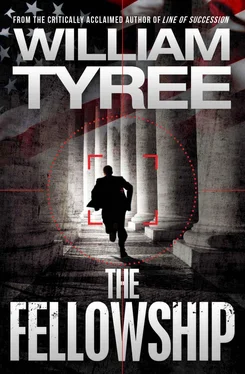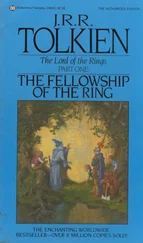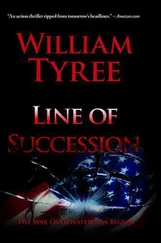William Tyree - The Fellowship
Здесь есть возможность читать онлайн «William Tyree - The Fellowship» весь текст электронной книги совершенно бесплатно (целиком полную версию без сокращений). В некоторых случаях можно слушать аудио, скачать через торрент в формате fb2 и присутствует краткое содержание. Год выпуска: 2013, Издательство: Massive, Жанр: Триллер, на английском языке. Описание произведения, (предисловие) а так же отзывы посетителей доступны на портале библиотеки ЛибКат.
- Название:The Fellowship
- Автор:
- Издательство:Massive
- Жанр:
- Год:2013
- ISBN:нет данных
- Рейтинг книги:5 / 5. Голосов: 1
-
Избранное:Добавить в избранное
- Отзывы:
-
Ваша оценка:
- 100
- 1
- 2
- 3
- 4
- 5
The Fellowship: краткое содержание, описание и аннотация
Предлагаем к чтению аннотацию, описание, краткое содержание или предисловие (зависит от того, что написал сам автор книги «The Fellowship»). Если вы не нашли необходимую информацию о книге — напишите в комментариях, мы постараемся отыскать её.
The Fellowship — читать онлайн бесплатно полную книгу (весь текст) целиком
Ниже представлен текст книги, разбитый по страницам. Система сохранения места последней прочитанной страницы, позволяет с удобством читать онлайн бесплатно книгу «The Fellowship», без необходимости каждый раз заново искать на чём Вы остановились. Поставьте закладку, и сможете в любой момент перейти на страницу, на которой закончили чтение.
Интервал:
Закладка:
She watched Captain Zack’s face as he absorbed the moral of the story. He was quiet for nearly a minute. “So you’re saying that everyone who’s ever heard that fable thinks about drowning when they hear the name of my water taxi business.”
“Not everyone. But hey, every customer counts, right?”
“The way I see it, the dangerous one in that story is the insect, not the frog. And as the water taxi driver, I’m the frog.”
“True. Well, I’m a Scorpio. And I promise not to sting you.”
He was silent for a few minutes. Finally he cleared his throat and said, “Here’s one. How about Titanic Taxis?”
Ellis laughed. At least he was thinking big.
The Apostolic Palace
Vatican City
Father Callahan donned a new white collar for his audience with Heinz Lang. In his years of services to the CIA and the Vatican, the priest had used his cover to gather sensitive information from a litany of powerful people throughout Europe. He had trafficked stolen data and weapons for some of the world’s most lethal operatives. He had eliminated a fanatic who planned to detonate a dirty bomb in St. Peter’s Square. Yet today, in preparation for a meeting with the 85-year-old head of Vatican Intelligence, his forehead was slick with sweat.
He climbed the stairs toward the third floor of the Apostolic Palace, rubbing a dollop of hand sanitizer between his palms and over his lips. After his tense evening with Agent Carver at Le Colonne , he had been up much of the night praying for guidance. Of his vow of poverty, he was sure to be in good standing with God. The entirety of his salary from the CIA and various other clients was piling up in a Swiss bank account, and would be tapped only in retirement, with more than half the funds slated for charity. Regarding his vow of chastity, he also presented a nearly flawless record, with his only slip a heated embrace and brief kiss with a widow he consoled early in his career as a priest. It was his vow of obedience that he had failed in. There was nothing he could do. Obedience to the CIA and obedience to God seemed, at the moment, like conflicting actions.
Although the Jesuits maintained a fortified headquarters nearby known as the Jesuit Curia — which was, coincidentally, less than a city block from Carver’s hotel room at the Palazzo della Rovere — Lang preferred to office in the Apostolic Palace. Citing security concerns, as well as a desire to be as close as possible to serve His Holiness, he had requested an office on the third floor and moved in less than a month after his election.
In a maze of offices, reception rooms and tiny chapels, Callahan spotted Lang’s office by the hallmark Greek IHT letters that were displayed in bronze above the door. The society explained this acronym — which the priest had also seen etched in ink on the bodies of the gunmen in the Rome morgue — as an abbreviation of the Greek spelling of Jesus, iota-eta-sigma . Rumors of alternate meanings had dogged the Jesuits for centuries. Some said that Constantine — the ancient master of the Roman Empire who had first declared Rome to be a Christian city — had created the acronym himself from the phrase In hoc signo vinces , meaning, “In this sign you shall conquer.”
Lang was behind his desk when the priest entered. Wood paneling behind it depicted painted images of the first three superiors general from the 1500s, Ignatius of Loyola, Francis Borgia and Everard Mercurian. Lang’s hair looked whiter than when Callahan had last met him, but his frame looked just as fit underneath his black ankle-length cassock. A simple wooden cross dangled from a necklace made of simple leather.
“Your Excellency,” Callahan said with his hands folded before him.
The corners of Lang’s lips curled up. He stood and walked around his desk, held out his right hand and watched as Callahan knelt and kissed the brass ring that bore the Jesuit symbol. It was said that superiors general in recent times had dispensed with this custom among their own kind, deeming it too demeaning for those within Vatican Intelligence.
But Lang was a classicist. During his reign as Jesuit Chief, he had openly yearned for the formal era of his youth, when the church’s exclusive use of Latin in Mass, elaborate liturgical rituals and formal attire added an aura of mystery to the Holy See.
He had been as active a superior general as the church had ever seen. Few before him had attempted to manage the entirety of the Jesuit mission. The society’s schools and orphanages and other groups operated in every corner of the world. Lang, having made a commitment to visit each and every one of the provinces during his first two years in the post, possessed an itinerary that would have been aggressive for anyone, let alone a man in his 70s and 80s. He appeared to have a limitless well of energy.
Since stepping down, he had brought the same level of devotion to Vatican Intelligence. Now Lang raised the hem of his cassock slightly and walked to a sitting area at the far end of the room, an intimate array of chairs where visitors could enjoy the priceless view afforded them from the Apostolic Palace.
“So,” Lang began. “When we last chatted, you were to inform me of any inroads we made as to the investigation. I assume by your insistence about this meeting that you have something to report that was too sensitive to be handled by telephone.”
“In a matter of speaking, Your Excellency,” Callahan replied before breaking out into a coughing fit.
“Is it that troubling?”
“Forgive me. The hours I’ve been keeping of late have not been good for my health.”
“Then I would thank you to cover your mouth with your sleeve when coughing. At my age, I can’t afford to get sick.”
“Naturally,” Callahan replied. “In regards to the matter at hand, I regret to report that the two young lads you asked me to find are in the city morgue.”
Lang’s face flattened. “Did they die violently?”
The priest nodded. “In a most brutal fashion, I’m afraid.”
Three days prior to Carver’s arrival in Rome, Callahan had received a surprise call from Lang, who had been visiting a Jesuit province in Brazil, where it was said that the church was losing ground to a groundswell of Mormon missionaries. But Lang’s call had nothing to do with evangelism. His request was cryptic, and he had given the priest almost no information to go on, other than to ask him to find two operatives who had disappeared in Rome after what he had described as a critical operation. He had mentioned only their names and nationalities. Lazlo Cruz, from Argentina, and Cesar Macchione, who was from Florence.
The superior general stood, clasped his hands behind his back, and went to the window, looking out over Rome. Callahan hoped that he would not be asked how he had discovered the young Jesuits’ bodies. Although Lang was fully aware of Callahan’s working relationship with the CIA and other intelligence organizations, revealing that the information had come to him via the Americans would only incite Lang’s legendary paranoia.
“I trust you did not claim the bodies.”
“Correct,” Callahan answered. “And as you asked, I instructed Venice to deny any knowledge of the men if police are somehow able to trace them there.”
Venice had been the birthplace of the Society in 1540, when Pope Paul III established the Jesuits as a formal religious order at the Palazzo San Marco. But the Jesuits had never been well received in the city of endless canals, and it had been abandoned as an outpost for centuries. Unbeknownst to most even within the Holy See, Lang had reclaimed it shortly after his election, transforming a shuttered church into a private barracks where future Vatican Intelligence agents were trained. When he had first learned of the Venice unit, and heard of the rumored 24 new recruits in training there, Callahan had wondered why intelligence services had been inflated at such a rapid rate. In recent years, they had fielded no more than 20 operatives in total. In light of recent events, Callahan was willing to entertain the notion that Agent Carver’s suspicions might be correct. Perhaps the Black Order had been resurrected after all.
Читать дальшеИнтервал:
Закладка:
Похожие книги на «The Fellowship»
Представляем Вашему вниманию похожие книги на «The Fellowship» списком для выбора. Мы отобрали схожую по названию и смыслу литературу в надежде предоставить читателям больше вариантов отыскать новые, интересные, ещё непрочитанные произведения.
Обсуждение, отзывы о книге «The Fellowship» и просто собственные мнения читателей. Оставьте ваши комментарии, напишите, что Вы думаете о произведении, его смысле или главных героях. Укажите что конкретно понравилось, а что нет, и почему Вы так считаете.











